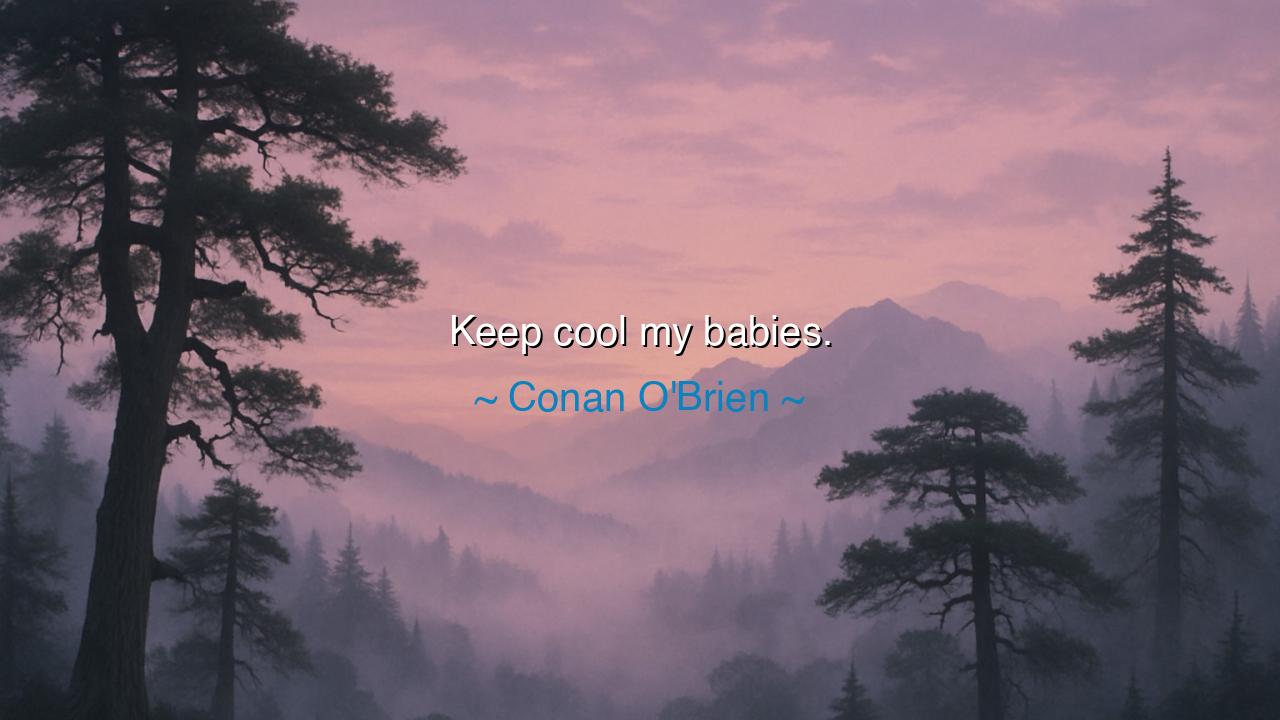
Keep cool my babies.






The words of Conan O’Brien—“Keep cool my babies”—though light and humorous in sound, carry within them a timeless wisdom, playful yet profound. To the casual ear, they may seem but a comedian’s farewell, a jest tossed into the wind at the end of a show. Yet, as with many words spoken in joy, they hide a truth deeper than laughter: a call to calmness amid chaos, to composure amid the heat of life’s storms. Beneath the cloak of comedy, O’Brien, a man who has weathered both triumph and trial, offers a teaching worthy of the ancients—to keep cool, to stay steady, to preserve grace when the world burns around you.
In the modern age, where tempests rise not from the sea but from the heart—from anxiety, anger, and noise—these words become a mantra for the soul. “Keep cool my babies” is not merely a comic signature; it is a benediction, a blessing to the audience, urging them to walk through the fires of existence with serenity. It reminds us that the spirit of play, of humor, is not weakness but strength. To laugh in the face of adversity, to smile through uncertainty, to keep one’s composure when the world trembles—this is the mark of inner mastery.
The origin of this phrase is simple and human. Conan O’Brien, the late-night jester of modern America, would close his show with these words—a farewell not of grand wisdom, but of affection. Yet, like the proverbs of old, what began as casual became eternal. It spoke of the bond between speaker and listener, artist and audience. His “babies” were not children in age, but in spirit—the viewers who looked to him for joy in a weary world. In this, O’Brien became a teacher without pretense: a man reminding his people that in laughter, there is salvation; in composure, there is strength.
The ancients, too, spoke of this virtue. The Stoics called it apatheia, the calm of the soul unshaken by fortune’s waves. The Buddha taught equanimity, the serene heart that neither clings to pleasure nor recoils from pain. And even the warriors of Sparta and Rome knew that panic in the mind was more fatal than the enemy’s sword. To keep cool, therefore, is not to deny emotion, but to rise above its tyranny. It is to remain centered in a world that would pull you apart. Conan, with humor as his shield, carries forward this ancient teaching in the form most natural to him—laughter as wisdom, wit as armor.
There is a story, too, that echoes this lesson. In the heat of war, the British general Wellington, standing before the cannons at Waterloo, appeared calm as the sky before dawn. An aide, trembling, asked how he could remain so composed. Wellington replied, “The only thing worse than being shot is being seen afraid.” This is the same essence that Conan shares with his audience: when storms rage, when the lights go out, when fate mocks your plans—stay cool. Hold your humor. Hold your heart. For composure is the quiet victory of the soul.
And yet, “my babies” softens the lesson with tenderness. It is not a command barked by a general, but a father’s reassurance, a friend’s embrace. It says: you are not alone in this world. You can laugh. You can rest. Even in struggle, gentleness must remain. This warmth, this humanity, transforms stoic endurance into compassion. It reminds us that calmness need not be cold—it can be loving, playful, kind.
So let this be your teaching: keep cool, not by fleeing hardship, but by meeting it with humor and heart. When the world grows loud, find the quiet within yourself. When anger tempts you, answer with patience. When fear whispers, answer with laughter. For in the end, composure is not stillness—it is strength disguised as peace.
And remember always the parting words of the jester-sage: “Keep cool, my babies.” For though spoken with a smile, they carry the wisdom of ages. They remind us that laughter is not escape—it is endurance; that calmness is not detachment—it is courage; and that even in chaos, the heart that stays cool will find its way home.






AAdministratorAdministrator
Welcome, honored guests. Please leave a comment, we will respond soon